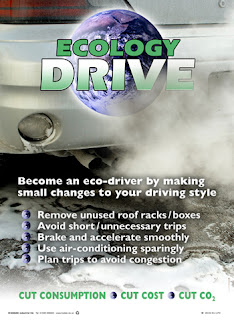 |
| 1 |
 |
| 2 |
 |
| 3 |
It's good news for the environment, but it isn't hard to see why such action is being taken. The latest figures from the AA show that the average prices of unleaded petrol and diesel have increased by 42% and 43% respectively since June 2006.
As fuel prices increase, so do transportation costs and, consequently, so does the cost of living. So it's not just motorists who are affected – it's everyone.
At Kodiak we have been extolling the virtues of eco-driving for years. As well as reducing fuel consumption and costs, it also reduces carbon emissions – making it a greener way to drive. Nowadays eco-driving, and the advice that goes with it, is a necessity for any company that uses vehicles – whether it's one company car or a fleet of trucks or buses.
These ten simple eco-driving techniques can help you save fuel and money.
1. Drive smoothly
Harsh braking and acceleration can increase your fuel consumption by up to 30%, so read the road ahead and allow yourself time to plan.
Harsh braking and acceleration can increase your fuel consumption by up to 30%, so read the road ahead and allow yourself time to plan.
2. Avoid making short or unnecessary trips
Starting the engine from cold uses up to twice as much fuel, so only do it if you have a worthwhile journey to make.
Starting the engine from cold uses up to twice as much fuel, so only do it if you have a worthwhile journey to make.
3. Use the right gear
Choosing an appropriate gear for the speed you are travelling at can save you up to 15% on your fuel bill.
Choosing an appropriate gear for the speed you are travelling at can save you up to 15% on your fuel bill.
4. Slow down
Travelling at 80 mph on the motorway, rather than the 70 mph speed limit, can increase your fuel consumption by up to 20%. Likewise, driving at 70 mph uses up to 20% more fuel than driving at 60 mph and 30% more than driving at 50 mph.
Travelling at 80 mph on the motorway, rather than the 70 mph speed limit, can increase your fuel consumption by up to 20%. Likewise, driving at 70 mph uses up to 20% more fuel than driving at 60 mph and 30% more than driving at 50 mph.
5. Take care of your vehicle
Regular servicing and maintenance keeps the engine at its most efficient – plus it keeps your vehicle running safely. A well-tuned engine can save you up to 10% on fuel, keeping your tyres inflated correctly can save you up to 3% and clean air filters can save up to 10%.
Regular servicing and maintenance keeps the engine at its most efficient – plus it keeps your vehicle running safely. A well-tuned engine can save you up to 10% on fuel, keeping your tyres inflated correctly can save you up to 3% and clean air filters can save up to 10%.
6. Plan your route
Motorists waste 350,000 tonnes of fuel each year by getting lost. Good route planning can help you avoid this and other common problems such as roadworks and congestion.
Motorists waste 350,000 tonnes of fuel each year by getting lost. Good route planning can help you avoid this and other common problems such as roadworks and congestion.
7. Ditch the air-conditioning when travelling below 60 mph
Having the air-conditioning switched on uses up to 25% more fuel. If you are travelling below 60 mph it's more economical to open a window.
Having the air-conditioning switched on uses up to 25% more fuel. If you are travelling below 60 mph it's more economical to open a window.
8. Avoid idling
Your engine should be turned off whenever you are stationary. An idling engine produces up to 80% more pollution than a moving vehicle. Also, restarting the engine actually uses less fuel than 10 seconds' idling.
9. Avoid revving the engine
It is pointless and it only wastes fuel. Be aware that if you are stationary with your foot hovering on the accelerator you may be revving unintentionally.
It is pointless and it only wastes fuel. Be aware that if you are stationary with your foot hovering on the accelerator you may be revving unintentionally.
10. Reduce weight
Remove any unnecessary items from your vehicle, especially things such as empty roof-racks and boxes, which also create drag.
Remove any unnecessary items from your vehicle, especially things such as empty roof-racks and boxes, which also create drag.
Kodiak's motivational poster programme regularly covers fuel economy and eco-driving.
If you would like to find out more about how our posters can keep your drivers reminded of fuel efficient driving techniques, please contact us.
For daily tips on dealing with common workplace issues, why not follow us on Twitter.
If you would like to find out how Kodiak posters
can help your business work smoother, smarter
and safer, please call us on: 01530 456 000
or email us.

No comments:
Post a Comment